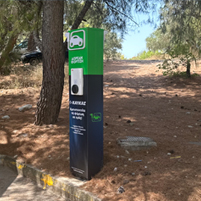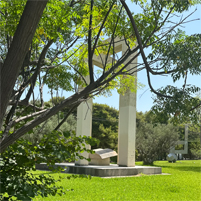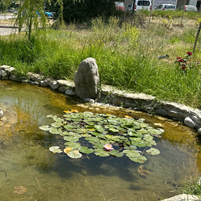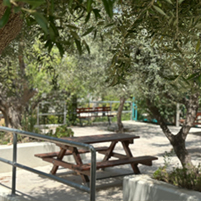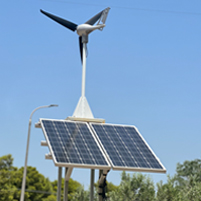Sustainable operation and development
The University of Patras, an institution based in the largest University campus in Greece with extensive green spaces and academic Departments, treats environmental issues in a responsible scientific manner, demonstrates a high level of awareness in terms of sound and efficient environmental management. It monitors, records, analyzes, and decides on relevant actions to improve the quality of the environment for the benefit not only of the university but also of the local community, and draws up responsible and applicable environmental policies.
Specifically, the Senate in its meeting No. 174/10.9.2020, after taking into account the Rector’s proposal, unanimously decided to establish the Sustainable-Green University Committee. The Committee works systematically to promote and coordinate coherent actions under the umbrella of a “Sustainable Green” University. These actions are detailed and coded based on the relevant objectives of the 17 Sustainable Development Goals in the report “Sustainable University of Patras and Sustainable Development Goals”. In summary, actions are already taking place such as:
- The adoption of circular economy solutions by promoting resource reuse practices, such as the reconstruction of computers through the use of open software, the free disposal of materials to third parties for reuse, etc.
- The adoption of policies of holistic exploitation of its outdoor areas, with full utilization of its olive grove for the production of olive oil, the exploitation of its timber, as well as the cooperation with a start-up company for the utilization of its agricultural waste.
- The environmental upgrade of buildings and infrastructure through targeted actions to reduce resource consumption, in order to minimize the environmental footprint. Five buildings have already been energy upgraded, while two more have been included in the “Eco – Economy” program.
- Promoting new energy sources, through the installation of charging stations for electric vehicles, as well as the reuse of energy sources by means of special chargers.
- The development of mechanisms for monitoring energy consumption and making decisions – in a timely manner – for its rationalization, as well as mechanisms for reducing the carbon footprint caused by the movement of materials and personnel is its responsibility. The University’s progress is documented and communicated through peer-reviewed scientific publications, such as Vrachni A, Christogerou A, Thomopoulos GA, Marazioti C, Angelopoulos GN. Carbon Footprint of the University of Patras in Greece: Evaluating Environmental Culture and Campus’ Energy Management towards 2030. Pollutants. 2022, 2(3):347-362.
- Promoting the recycling of resources, such as electrical and electronic devices, paper, plastic, inks, batteries, etc., in collaboration with local government and non-profit partners, as well as the use of green/eco-friendly cleaning materials.
- Continued redesign of the campus map to include new green zones (such as the peri-urban park), planting and transplanting of trees, green routes for pedestrians and cyclists, procurement of electric and conventional bicycles, creation of a parking base and photovoltaic charging system, etc., with the aim to provide quality living, sports and recreation to all members of the community.
- The proper management of water resources, such as rainwater to avoid soil erosion, the replacement of the water supply network to improve water quality and reduce losses, the treatment of wastewater to minimize the pollutant load that ends up in the Gulf of Patras and the irrigation of green spaces using treated wastewater.
More information is available on the website https://green.upatras.gr . Evidence of the University of Patras’ compliance with indicators that address the Sustainable Development Goals can be found on the dedicated portal https://bookstack.library.upatras.gr/books/public-evidence.
Socially responsible operation and Sustainable procurement
At the same time, the University utilizes all the vital space provided by national and community legislation to support local entrepreneurship, especially small and medium-sized enterprises, to provide sustainable working conditions at regional level and to reduce the carbon footprint of unnecessary transport of products. Emphasis is also placed on supporting young, start-up and innovative entrepreneurship, especially when its activities contribute to the reorganization of the primary sector.
At the same time, the University makes sure that food rations left over on a daily basis from those distributed at the Student Residence are used for the benefit of the socially and economically vulnerable citizens of the region. Other units of the University, such as the Library and Information Center, take initiatives, such as the “book exchange desk”, to collect food that is responsibly distributed to social welfare structures.
At the same time, the University makes use of all the vital space provided by national and EU legislation to support local entrepreneurship, especially small and medium-sized enterprises, so that there are sustainable working conditions at the regional level and the carbon footprint from unnecessary transport of products is reduced. Particular emphasis is also placed on supporting young, start-up and innovative entrepreneurship, especially when their activities contribute to the reorganization of the primary sector.
At the same time, the University ensures that portions of food that are left over on a daily basis from the distribution of the Student Hostel are used for the benefit of the socially and economically challenged citizens of the area. Units of the Foundation, such as the Library and Information Center, take initiatives, such as the exchange book counter, to collect food that is responsibly disposed of in social structures.
Furthermore, the University of Patras strongly promotes sustainability through its various procurement practices. The University’s procurement staff as well as faculty, scientists, technical and administrative staff are strongly advised to consider the societal well-being and health as well as the environmental impact when purchasing goods and services. In this regard the University strongly recommends and supports a number of activities including:
- The purchase of rechargeable batteries instead of single use batteries to minimize waste. The University further provides numerous battery recycling points.
- The use of energy efficient bulbs and lightening products is strongly advised.
- The University supports the minimization of paper consumption and printing while the use of recyclable paper is strongly recommended.
- The catering services and student canteens should minimize food waste and cater according to demand.
- Air-conditioning and heaters purchased should be eco-friendly.
- In all equipment purchases the University strongly advises its users to consider the lifetime of the product.

